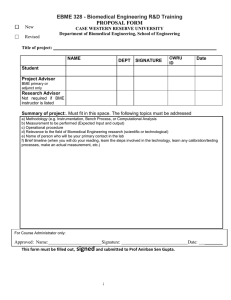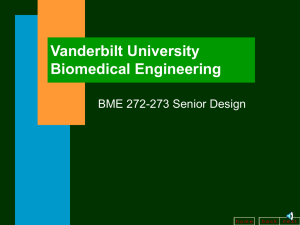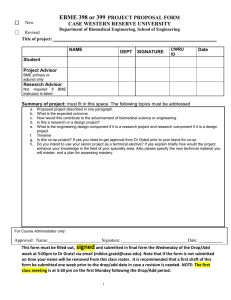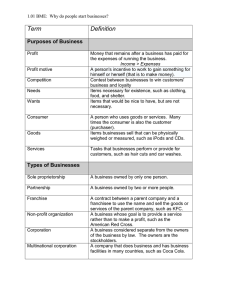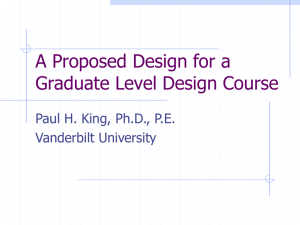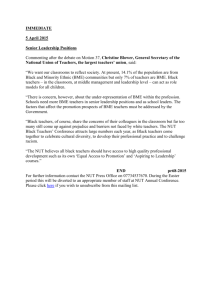Department of Biomedical Engineering
advertisement
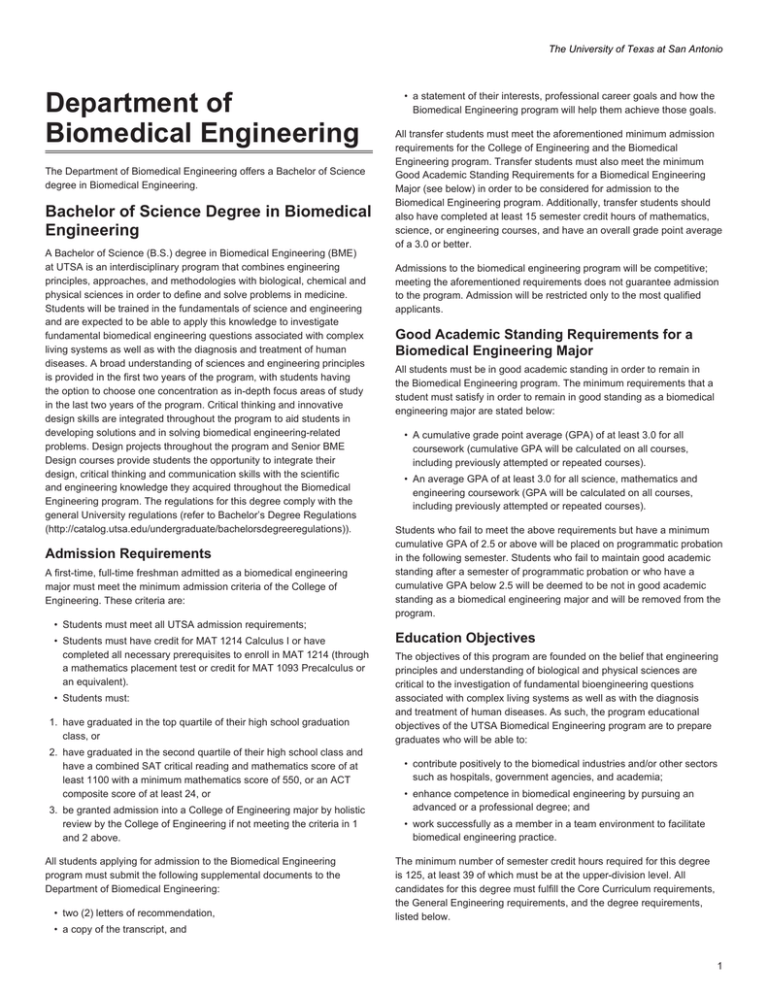
The University of Texas at San Antonio Department of Biomedical Engineering The Department of Biomedical Engineering offers a Bachelor of Science degree in Biomedical Engineering. Bachelor of Science Degree in Biomedical Engineering A Bachelor of Science (B.S.) degree in Biomedical Engineering (BME) at UTSA is an interdisciplinary program that combines engineering principles, approaches, and methodologies with biological, chemical and physical sciences in order to define and solve problems in medicine. Students will be trained in the fundamentals of science and engineering and are expected to be able to apply this knowledge to investigate fundamental biomedical engineering questions associated with complex living systems as well as with the diagnosis and treatment of human diseases. A broad understanding of sciences and engineering principles is provided in the first two years of the program, with students having the option to choose one concentration as in-depth focus areas of study in the last two years of the program. Critical thinking and innovative design skills are integrated throughout the program to aid students in developing solutions and in solving biomedical engineering-related problems. Design projects throughout the program and Senior BME Design courses provide students the opportunity to integrate their design, critical thinking and communication skills with the scientific and engineering knowledge they acquired throughout the Biomedical Engineering program. The regulations for this degree comply with the general University regulations (refer to Bachelor’s Degree Regulations (http://catalog.utsa.edu/undergraduate/bachelorsdegreeregulations)). Admission Requirements A first-time, full-time freshman admitted as a biomedical engineering major must meet the minimum admission criteria of the College of Engineering. These criteria are: • a statement of their interests, professional career goals and how the Biomedical Engineering program will help them achieve those goals. All transfer students must meet the aforementioned minimum admission requirements for the College of Engineering and the Biomedical Engineering program. Transfer students must also meet the minimum Good Academic Standing Requirements for a Biomedical Engineering Major (see below) in order to be considered for admission to the Biomedical Engineering program. Additionally, transfer students should also have completed at least 15 semester credit hours of mathematics, science, or engineering courses, and have an overall grade point average of a 3.0 or better. Admissions to the biomedical engineering program will be competitive; meeting the aforementioned requirements does not guarantee admission to the program. Admission will be restricted only to the most qualified applicants. Good Academic Standing Requirements for a Biomedical Engineering Major All students must be in good academic standing in order to remain in the Biomedical Engineering program. The minimum requirements that a student must satisfy in order to remain in good standing as a biomedical engineering major are stated below: • A cumulative grade point average (GPA) of at least 3.0 for all coursework (cumulative GPA will be calculated on all courses, including previously attempted or repeated courses). • An average GPA of at least 3.0 for all science, mathematics and engineering coursework (GPA will be calculated on all courses, including previously attempted or repeated courses). Students who fail to meet the above requirements but have a minimum cumulative GPA of 2.5 or above will be placed on programmatic probation in the following semester. Students who fail to maintain good academic standing after a semester of programmatic probation or who have a cumulative GPA below 2.5 will be deemed to be not in good academic standing as a biomedical engineering major and will be removed from the program. • Students must meet all UTSA admission requirements; • Students must have credit for MAT 1214 Calculus I or have completed all necessary prerequisites to enroll in MAT 1214 (through a mathematics placement test or credit for MAT 1093 Precalculus or an equivalent). • Students must: 1. have graduated in the top quartile of their high school graduation class, or 2. have graduated in the second quartile of their high school class and have a combined SAT critical reading and mathematics score of at least 1100 with a minimum mathematics score of 550, or an ACT composite score of at least 24, or 3. be granted admission into a College of Engineering major by holistic review by the College of Engineering if not meeting the criteria in 1 and 2 above. All students applying for admission to the Biomedical Engineering program must submit the following supplemental documents to the Department of Biomedical Engineering: • two (2) letters of recommendation, Education Objectives The objectives of this program are founded on the belief that engineering principles and understanding of biological and physical sciences are critical to the investigation of fundamental bioengineering questions associated with complex living systems as well as with the diagnosis and treatment of human diseases. As such, the program educational objectives of the UTSA Biomedical Engineering program are to prepare graduates who will be able to: • contribute positively to the biomedical industries and/or other sectors such as hospitals, government agencies, and academia; • enhance competence in biomedical engineering by pursuing an advanced or a professional degree; and • work successfully as a member in a team environment to facilitate biomedical engineering practice. The minimum number of semester credit hours required for this degree is 125, at least 39 of which must be at the upper-division level. All candidates for this degree must fulfill the Core Curriculum requirements, the General Engineering requirements, and the degree requirements, listed below. • a copy of the transcript, and 1 Department of Biomedical Engineering Core Curriculum Requirements (42 semester credit hours) EGR 2323 Applied Engineering Analysis I Biomedical Engineering Requirements Students seeking the Bachelor of Science degree in Biomedical Engineering must fulfill the University Core Curriculum requirements in the same manner as other students. The courses listed below satisfy both major requirements and Core Curriculum requirements; however, if these courses are taken to satisfy both requirements, then students may need to take additional courses in order to meet the minimum number of semester credit hours required for the degree. A. Core Biomedical Engineering Requirements All students majoring in Biomedical Engineering are required to complete 36 semester credit hours in the following Core Biomedical Engineering courses. BME 1002 Introduction to Biomedical Engineering 2 BME 2103 Physiology for Biomedical Engineering 3 MAT 1214 may be used to satisfy the core requirement in Mathematics, as well as one of the General Engineering Requirements. BIO 1404 and PHY 1943 may be used to satisfy the core requirement in Life and Physical Sciences, as well as one of the General Engineering Requirements. BME 2203 Biomechanics I 3 BME 3003 Biomaterials I 3 BME 3013 Clinical Internship in Biomedical Engineering 3 BME 3022 Biomedical Engineering Technology and Product Development 2 Core Curriculum Component Area Requirements (http:// catalog.utsa.edu/undergraduate/bachelorsdegreeregulations/ degreerequirements/corecurriculumcomponentarearequirements) BME 3114 Cellular Biology for Biomedical Engineering 4 BME 3211 Biomedical Engineering Laboratory I 1 BME 3303 Bioinstrumentation 3 First Year Experience Requirement 3 BME 3311 Biomedical Engineering Laboratory II 1 Communication 6 BME 3703 Biotransport Phenomena 3 Mathematics 3 BME 3711 Biomedical Engineering Laboratory III 1 Life and Physical Sciences 6 BME 4903 Senior BME Design I 3 Language, Philosophy and Culture 3 BME 4913 Senior BME Design II 3 Creative Arts 3 B. Other Required Courses American History 6 Government-Political Science 6 All students majoring in Biomedical Engineering are required to complete 6 semester credit hours in the following: Social and Behavioral Sciences 3 CHE 1113 General Chemistry II 3 3 STA 1403 Probability and Statistics for the Biosciences 3 Component Area Option Total Credit Hours 42 C. Biomedical Engineering Electives CHE 1103 General Chemistry I 3 EGR 2323 Applied Engineering Analysis I 3 A minimum of 15 semester credit hours is required to fulfill this requirement. 9 semester credit hours of Biomedical Engineering elective courses must be selected from one of the following concentrations. The remaining semester credit hours must be selected from other concentrations to satisfy the Biomedical Engineering electives. Up to 6 semester credit hours of graduatelevel biomedical engineering courses may be used to satisfy the Biomedical Engineering electives, with the approval of the advisor, instructor, Graduate Program Director, and Department Chair. MAT 1214 Calculus I 4 Biomechanics Concentration MAT 1224 Calculus II 4 General Engineering Requirements All degree-seeking candidates in engineering must complete the following 22 semester credit hours, as well as the Core Curriculum requirements and major requirements: or EGR 1324 PHY 1943 & PHY 1951 PHY 1963 & PHY 1971 Calculus II for Engineers Physics for Scientists and Engineers I and Physics for Scientists and Engineers I Laboratory Physics for Scientists and Engineers II and Physics for Scientists and Engineers II Laboratory Total Credit Hours 4 4 22 BME 3033 Biomedical Engineering Internship BME 3043 Biomedical Engineering Research BME 3203 Biomechanics II: Cardiovascular BME 4203 Biomechanics III BME 4293 Topics in Biomechanics BME 4703 Biomedical Engineering Thermodynamics BME 4803 Fundamental Computational Bioengineering Biomaterials, Cellular, and Tissue Engineering Concentration BME 3033 Biomedical Engineering Internship Gateway Course BME 3043 Biomedical Engineering Research Students pursuing the Bachelor of Science degree in Biomedical Engineering must successfully complete the following Gateway Course with a grade of “C-” or better in no more than two attempts. A student who is unable to successfully complete this courses within two attempts, including dropping the course with a grade of “W” or taking an equivalent course at another institution, will be required to change his or her major. BME 3403 Biomaterials II BME 3413 Biocompatibility of Materials: Tissue-Biomaterial Interaction BME 4403 Molecular Techniques for Cell-Biomaterials Interactions BME 4423 Tissue Engineering 2 | 09/30/16 15 The University of Texas at San Antonio BME 4483 Topics in Biomaterials BME 4493 Topics in Tissue Engineering PHY 1951 Physics for Scientists and Engineers I Laboratory 1 BME 4713 BME 4793 Cellular Engineering WRC 1023 Freshman Composition II (Q) (core) 3 Topics in Cellular Engineering Second Year BME 2103 Physiology for Biomedical Engineering 3 Biomedical Imaging and Nanobiotechnology Concentration Fall BME 3033 Biomedical Engineering Internship BME 3043 Biomedical Engineering Research BME 3503 Nanomaterials and Nanobiotechnology EGR 2103 Statics (Tech Elective) 3 BME 4503 Biosensors STA 1403 3 BME 4603 Biophotonics Probability and Statistics for the Biosciences BME 4613 Biomedical Imaging MAT 2214 Calculus III (Tech Elective) 4 Biomedical Optics PHY 1963 Physics for Scientists and Engineers II 3 PHY 1971 Physics for Scientists and Engineers II Laboratory 1 BME 2203 Biomechanics I 3 EGR 2323 Applied Engineering Analysis I 3 BME 3003 Biomaterials I 3 BME 3114 Cellular Biology for Biomedical Engineering 4 BME 3211 Biomedical Engineering Laboratory I 1 Clinical Internship in Biomedical Engineering 3 BME 3303 Bioinstrumentation 3 BME 3311 Biomedical Engineering Laboratory II 1 POL 1133 or 1213 Texas Politics and Society (core) 3 BME 4623 D. Technical Electives A minimum of 9 semester credit hours of Technical Electives must be completed by all students. Depending on interest, students should select appropriate courses in sciences and engineering in order to enhance their basic engineering and scientific training. Examples of Technical Electives are: 9 Spring Engineering Courses EE 2213 Electric Circuits and Electronics EE 2423 Network Theory EE 3533 Random Signals and Noise EGR 2103 Statics ME 3293 Thermodynamics I Summer ME 3813 Mechanics of Solids BME 3013 Science Courses BIO 1414 Biosciences II BIO 2313 Genetics BIO 3913 Molecular Biology CHE 2603 Organic Chemistry I CHE 2612 Organic Chemistry I Laboratory CHE 3643 Organic Chemistry II CHE 4303 Biochemistry Total Credit Hours Third Year Fall 65 Technical elective 3 Upper-division BME elective 3 Spring B.S. in Biomedical Engineering – Recommended Four-Year Academic Plan BME 3022 Biomedical Engineering Technology and Product Development 2 BME 3703 Biotransport Phenomena 3 First Year BME 3711 Biomedical Engineering Laboratory III 1 Fall AIS 1203 Credit Hours Academic Inquiry and Scholarship (core) 3 BIO 1404 Biosciences I (core and major) 4 CHE 1103 General Chemistry I 3 Summer MAT 1214 Calculus I (core and major) 4 BME 3033 WRC 1013 Freshman Composition I (Q) (core) 3 Upper-division BME elective 3 POL 1013 Introduction to American Politics (core) 3 Biomedical Engineering Internship (BME Elective) 3 Senior BME Design I 3 Fourth Year Spring Fall BME 1002 Introduction to Biomedical Engineering 2 CHE 1113 General Chemistry II 3 Upper-division BME elective 3 MAT 1224 Calculus II 4 Upper-division BME elective 3 PHY 1943 Physics for Scientists and Engineers I (core) 3 American History core 3 Creative Arts core 3 BME 4903 Spring 3 Department of Biomedical Engineering BME 4913 Senior BME Design II 3 American History core 3 Component Area Option core 3 Language, Philosophy and Culture core 3 Social and Behavioral Sciences core 3 Total Credit Hours: 125.0 Biomedical Engineering (BME) Courses BME 1002. Introduction to Biomedical Engineering. (2-0) 2 Credit Hours. Prerequisites: A grade of “C-” or better in BIO 1404, CHE 1103, and MAT 1214, and concurrent enrollment in CHE 1113, MAT 1224, PHY 1943, and PHY 1951. This course is an introduction to the interdisciplinary field of biomedical engineering. Topics covered include core biomedical engineering areas such as Biomechanics, Biomaterials and Bioimaging. Generally offered: Spring. BME 2103. Physiology for Biomedical Engineering. (3-1) 3 Credit Hours. Prerequisites: Major in Biomedical Engineering and a grade of “C-” or better in BIO 1404 and CHE 1113. Fundamental principles of general and organs systems physiology, including composition and concentration of cellular and other body fluids, types of transport (e.g., diffusion, membrane transporters), energy (thermodynamics, metabolism), enzymes, feedback control, and membrane potentials with engineering applications and mathematical modeling. This course includes a 3 hour lecture and a 1 hour recitation. Generally offered: Fall. BME 2203. Biomechanics I. (3-1) 3 Credit Hours. Prerequisites: A grade of “C-” or better in EGR 2323 and PHY 1963. Introduction to the fundamental engineering mechanics with focus on the human body. This course includes a 3 hour lecture and a 1 hour recitation. Generally offered: Spring. BME 3003. Biomaterials I. (3-1) 3 Credit Hours. Prerequisites: A grade of “C-” or better in BIO 1404 and CHE 1113. Introduction to the fundamental science of natural and synthetic biomaterials used for repairing human tissues and organs. Topics include crystal structures, phase diagrams, and properties of materials. This course includes a 3-hour lecture and a 1-hour recitation. (Formerly BME 2403. Credit cannot be earned for both BME 3003 and BME 2403). BME 3013. Clinical Internship in Biomedical Engineering. (0-0) 3 Credit Hours. Prerequisites: A grade of “C-” or better in BME 2203, BME 3003, and BME 3114. This course will introduce students to the clinical environment, interacting with clinicians on current clinical problems and engineering approaches. Generally offered: Summer. BME 3022. Biomedical Engineering Technology and Product Development. (2-0) 2 Credit Hours. Prerequisite: A grade of “C-” or better in BME 3013. This course will introduce students to current biomedical technologies and product development. (Formerly BME 3023. Credit cannot be earned for both BME 3022 and BME 3023.). BME 3033. Biomedical Engineering Internship. (0-0) 3 Credit Hours. Prerequisite: A grade of “C-” or better in BME 3022. Internship with a biomedical industry. May be repeated for credit but no more than 3 semester credit hours will apply to a bachelor’s degree. 4 | 09/30/16 BME 3041. Biomedical Engineering Research. (0-0) 1 Credit Hour. Prerequisite: Consent of instructor. Advanced laboratory practice and introduction to biomedical engineering research. This course may be counted as one of the courses to satisfy one of the BME tracks. May be repeated for credit but no more than 3 semester credit hours will apply towards a bachelor’s degree in Biomedical Engineering. BME 3042. Biomedical Engineering Research. (0-0) 2 Credit Hours. Prerequisite: Consent of instructor. Advanced laboratory practice and introduction to biomedical engineering research. This course may be counted as one of the courses to satisfy one of the BME tracks. May be repeated for credit but no more than 3 semester credit hours will apply towards a bachelor’s degree in Biomedical Engineering. BME 3043. Biomedical Engineering Research. (0-0) 3 Credit Hours. Prerequisite: Consent of instructor. Advanced laboratory practice and introduction to biomedical engineering research. This course may be counted as one of the courses to satisfy one of the BME tracks. May be repeated for credit but no more than 3 semester credit hours will apply towards a bachelor’s degree in Biomedical Engineering. BME 3114. Cellular Biology for Biomedical Engineering. (3-4) 4 Credit Hours. Prerequisites: Major in Biomedical Engineering and a grade of “C-” or better in BME 2103 and CHE 1113. Introduction to cell structure and function, energy conversions, protein sorting, signaling, cytoskeleton, cell adhesion, cell cycle, and mammalian genetics. A laboratory component will focus on techniques and procedures commonly used in cell and molecular biology with bioengineering applications. This class includes a 3-hour lecture and a 4-hour laboratory. (Formerly BME 2114. Credit cannot be earned for both BME 3114 and BME 2114). BME 3203. Biomechanics II: Cardiovascular. (3-0) 3 Credit Hours. Prerequisites: A grade of “C-” or better in BME 2203 and BME 3211. Continuation of fundamental biomechanics to include elasticity, viscoelasticity, deformation, stress analysis, blood flow in the systemic and pulmonary circulation, and fluid-structure interaction. Generally offered: Fall. BME 3211. Biomedical Engineering Laboratory I. (0-4) 1 Credit Hour. Prerequisites: A grade of “C-” or better in PHY 1963 and STA 1403. A biomedical engineering lab in biomechanics and biomaterials. This labbased course will emphasize on the synthesis and characterization of mechanical properties as well as physical and chemical properties of biomaterials. (Formerly BME 2211. Credit cannot be earned for both BME 3211 and BME 2211). BME 3303. Bioinstrumentation. (3-1) 3 Credit Hours. Prerequisites: A grade of “C-” or better in BME 2203, BME 3114, EGR 2323, and PHY 1963, and concurrent enrollment in BME 3311. Fundamental principles of bioinstrumentation used in clinical and research measurements will be covered. Topics include: principles of transducer operation, amplifiers and signal processing, recording and display. This course includes a 3 hour lecture and a 1 hour recitation. Generally offered: Fall. BME 3311. Biomedical Engineering Laboratory II. (0-4) 1 Credit Hour. Prerequisites: A grade of “C-” or better in BME 3114, BME 3211, and STA 1403, and concurrent enrollment in BME 3303. A biomedical engineering lab in bioinstrumentation. This course will involve the design and testing of hardware and software for acquiring and analyzing biological signals. Generally offered: Fall. The University of Texas at San Antonio BME 3403. Biomaterials II. (1-5) 3 Credit Hours. Prerequisites: A grade of “C-” or better in BME 3003 and BME 3211. This course will emphasize materials used in medical applications, including modifications and characterization techniques. This course includes a 1 hour lecture and a 5 hour laboratory. BME 4293. Topics in Biomechanics. (3-0) 3 Credit Hours. Prerequisites: Senior status with a major in Biomedical Engineering and a grade of “C-” or better in BME 3203. Specific topics in biomechanics. May be repeated for credit when topics vary, but not more than 6 semester credit hours will apply to a bachelor’s degree. BME 3413. Biocompatibility of Materials: Tissue-Biomaterial Interaction. (3-0) 3 Credit Hours. Prerequisites: A grade of “C-” or better in BME 3003 and BME 3211. This course is an introduction to biocompatibility with special emphasis on the interaction of cells and tissues with biomaterials. Blood composition and blood-material interactions, responses of the inflammatory and immune systems to biomaterials, the process of wound healing, protein structure and interactions with material surfaces, and the mechanisms of cell interactions with extracellular matrix components as well as cell/tissue responses to implant materials are reviewed in detail. Case studies of cardiovascular and orthopaedic implants are discussed to illustrate that selection of biocompatible materials is a key aspect of implant design and a crucial choice for the success of various biomedical applications (e.g., tissue engineering and biotechnology) which require regeneration of tissues. Generally offered: Fall. BME 4403. Molecular Techniques for Cell-Biomaterials Interactions. (2-4) 3 Credit Hours. Prerequisite: A grade of “C-” or better in BME 3003. Advanced molecular techniques for characterizing cell-biomaterials interactions will be taught. Current understanding of topics in cell receptors and signaling mechanisms with application for biomaterial design will be emphasized. Topics will include receptor-ligand communication, methods of identification and quantification, and pathways involved for cell to material stress response. This course includes a 2 hour lecture and a 4 hour laboratory. BME 3503. Nanomaterials and Nanobiotechnology. (3-0) 3 Credit Hours. Prerequisites: A grade of “C-” or better in BME 3003 and BME 3211. This course will introduce an overview of nanomaterials and nanotechnology development. Topics may include biocompatible nanomaterials, microfabrication, microfluidics, lab-on-a-chip, and applications in biomedical engineering. (Formerly titled “Fundamentals of Nanobiotechnology.”) Generally offered: Spring. BME 3703. Biotransport Phenomena. (3-1) 3 Credit Hours. Prerequisites: A grade of “C-” or better in BME 3114, BME 3303, EGR 2323 and PHY 1963, and concurrent enrollment in BME 3711. This course introduces the concepts of quantitative modeling of biological systems with respect to mass, momentum and energy transport. We will study the use of conservation laws to model cardiopulmonary, renal, and thermal systems of the human physiology, and also apply these principles to design artificial and extracorporeal devices, drug delivery systems for pharmacokinetic analysis. This course includes a 3 hour lecture and a 1 hour recitation. Generally offered: Spring. BME 3711. Biomedical Engineering Laboratory III. (0-4) 1 Credit Hour. Prerequisites: A grade of “C-” or better in BME 3114, BME 3303, and STA 1403, and concurrent enrollment in BME 3703. A biomedical engineering lab in biotransport phenomena. Experiments related to mass, momentum, and energy conservation in biological systems such as measurements of apparent viscosity in microcirculation, oxygen diffusivity and thermal conductivity. Generally offered: Spring. BME 4203. Biomechanics III. (3-0) 3 Credit Hours. Prerequisites: A grade of “C-” or better in BME 3203. Topics may include elasticity, viscoelasticity, deformation, stress analysis, strain measurement, and stress and strain in organs. Tissues covered may include heart, blood vessels, cartilage, and bone. BME 4213. Tissue Mechanics. (3-0) 3 Credit Hours. Prerequisite: A grade of “C-” or better in BME 2203. Topics may include biomechanics characterization, modeling, and properties of regenerating tissues ranging from bone, cartilage, tendons, ligaments, skin, adipose tissue, nerves, bladder, eye, and pulmonary and cardiovascular tissues. BME 4423. Tissue Engineering. (3-0) 3 Credit Hours. Prerequisite: A grade of “C-” or better in BME 3003. This course is an introduction to the current status of, practice, and advances in tissue engineering, the biomedical engineering discipline that applies science and technology to develop replacements for damaged and/or diseased tissues of the body. The course focuses on fundamental aspects of new tissue formation, specifically, cells, biomaterials, biochemical and biophysical stimuli. Applications in bone, cartilage, skin, and vascular tissues are reviewed in detail. Strategies which are used to address current challenges, pursue emerging opportunities and explore new directions are discussed. BME 4483. Topics in Biomaterials. (3-0) 3 Credit Hours. Prerequisites: Senior status with a major in Biomedical Engineering and a grade of “C-” or better in BME 3403. Specific topics in biomaterials. May be repeated for credit when topics vary, but not more than 6 semester credit hours will apply to a bachelor’s degree. BME 4493. Topics in Tissue Engineering. (3-0) 3 Credit Hours. Prerequisites: Senior status with a major in Biomedical Engineering and a grade of “C-” or better in BME 4423. Specific topics in tissue engineering. May be repeated for credit when topics vary, but not more than 6 semester credit hours will apply to a bachelor’s degree. BME 4503. Biosensors. (3-0) 3 Credit Hours. Prerequisite: A grade of “C-” or better in BME 3503. Basics to biological detection and in-depth view of device design and performance analyses. Topics may include optical, electrochemical, acoustic, piezoelectric, and nanobiosensors. BME 4603. Biophotonics. (3-0) 3 Credit Hours. Prerequisite: A grade of “C-” or better in BME 3303. This course will introduce the fundamental principles of biophotonics and will focus on their applications to address critical issues in the frontier of biomedical science and technology. Topics may include fundamentals of light interactions with molecules, cells, and tissues, optical imaging, optical biosensing, flow cytometry, photodynamic therapy, laser tweezers and laser surgery, and nanobiotechnology. Generally offered: Fall. BME 4613. Biomedical Imaging. (3-0) 3 Credit Hours. Prerequisites: A grade of “C-” or better in BME 4603. This course will examine, from a systems perspective, the techniques used in a variety of medical imaging modalities, which include x-ray imaging, computed tomography, magnetic resonance imaging, nuclear medicine, ultrasound imaging, and photoacoustic imaging. The fundamental principles and engineering underlying each imaging modality will be discussed and a performance analysis of each system will be examined. 5 Department of Biomedical Engineering BME 4623. Biomedical Optics. (3-0) 3 Credit Hours. Prerequisite: A grade of “C-” or better in BME 3303. This course will introduce the fundamental principles of modern and classical optics and their applications for biomedical research. State-of-the-art topics on cutting-edge research in the area of optics and lasers in medicine and biology will be covered. BME 4703. Biomedical Engineering Thermodynamics. (3-1) 3 Credit Hours. Prerequisites: A grade of “C-” or better in BME 3703 and EGR 2323. This course is introduces the basics of engineering thermodynamics and applications in biomedical engineering. The course covers first and second laws, properties of pure substances and mixtures, phase rule, phase and chemical equilibria, and an introduction to statistical thermodynamics. This course includes a 3 hour lecture and a 1 hour recitation. BME 4713. Cellular Engineering. (3-0) 3 Credit Hours. Prerequisites: A grade of “C-” or better in BME 3703. This course focuses on using engineering skills and principles in the analysis and design of cellular functions. The emphasis will be on protein biochemistry, cell metabolism, signaling and adhesion. BME 4793. Topics in Cellular Engineering. (3-0) 3 Credit Hours. Prerequisites: Senior status with a major in Biomedical Engineering and a grade of “C-” or better in BME 4713. Specific topics in cellular engineering. May be repeated for credit when topics vary, but not more than 6 semester credit hours will apply to a bachelor’s degree. BME 4803. Fundamental Computational Bioengineering. (3-0) 3 Credit Hours. Prerequisites: Major in Biomedical Engineering and a grade of “C-” or better in BME 3114 and EGR 2323. This course will include fundamental knowledge and skills of mathematical modeling, computer simulation and visualization, with applications in biomedical engineering. BME 4903. Senior BME Design I. (3-0) 3 Credit Hours. Prerequisite: Senior status with a major in Biomedical Engineering and a grade of “C-” or better in BME 3022 and STA 1403. Development of project proposals and presentation of conceptual designs. Industrial collaboration and/or faculty sponsorship of these projects is encouraged. BME 4913. Senior BME Design II. (3-0) 3 Credit Hours. Prerequisite: Senior status with a major in Biomedical Engineering and a grade of “C-” or better in BME 4903. Continuation of the development of an instructor-approved design project, testing of the design project, and presentation of the findings. Industrial cooperation or faculty sponsorship of projects is encouraged. 6 | 09/30/16

